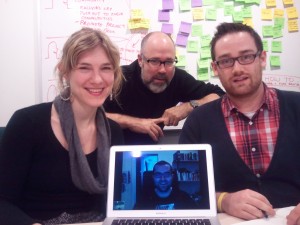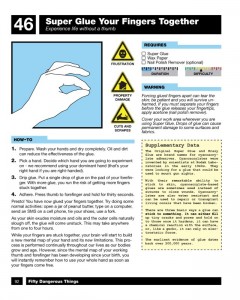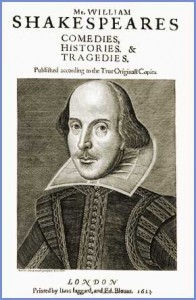Update: I’ve revised in response to comments below through 12/17. Thanks, everyone!!
I am liveblogging the manuscript process of writing Learning Freedom and the Web: The Book. Previous posts here and here. Your comments and editing suggestions are welcome, nay, encouraged, nay, begged for. You can also find a directly editable version of this text at this Etherpad.
Barcelona, Fall 2010:
Two powerful vectors of change converge in a public square. Although the forces are unpredictable, and many of the outcomes of their convergence will be unintended, this experiment is not entirely uncontrolled. Like Doc and Marty McFly in Hill Valley, the team has calculated the likely conditions, wired in all the right connections. When lightning strikes, we’ll be ready.
The first vector rumbles like a seismic wave from the basements of the ivory tower and the schoolhouse down your block. The demand for access to both existing and new and better models of learning is rising as uncontrollably as the average temperature throughout the globe. The traditional educational ecosystem is edging toward collapse. Fifty million university students in 2000 will grow to 250 million by 2025, and the graph of educational costs is a hockey stick–headed straight up. Four hundred million children around the world have no access to school at all. No country in the world has a plan to fix this.
Meanwhile, informal learning–the kind we do all day every day, as long as our eyes are open and we’re not in school–is going through an unprecedented Cambrian explosion. “How to” is one of the top searches on Google. YouTube hosts millions of videos that can teach you to deliver a baby or solve a Rubik’s cube. An entire generation of Web geeks is functioning more or less self-taught, because traditional curricula can’t keep up with the skills they need.
Informal learning really glows with possibility when it meets hardcore learning materials.
For the past ten years, the Open Educational Resources (OER) movement has released thousands of entire courses from pre-K to PhD–lectures, exams, serious games, and everything in between–that can be freely shared under licenses like Creative Commons. Free textbooks are a potent gateway drug: OER already has support from tens of foundations, hundreds of schools and dozens of governments. Obama’s Department of Education has thrown its weight behind the cause of open licensing all educational content created with government funds.
Now, innovators are found thick on the ground both within and outside the academy. Open learning and open courseware couldn’t exist without the network of passionate, committed educators employed in traditional institutions, like Davidson and Wiley, for two.
Yet even as the ground shifts under its feet, formal education as a whole has its head stuck in the sand. There’s a little debate going: Do today’s prevailing schooling models owe more to the monks of the 1400s or the bureaucrats of the industrial revolution?
The problem is ancient, says David Wiley, professor at Brigham Young University and one of the godfathers of open educational content. “About 500 years ago the primary mode of teaching in the university was to come in with blank sheets of paper and listen to the professor recite from a manuscript so you could make your own copy of the book,” he told the crowd on Drumbeat Festival’s opening night. “There was an opportunity 500 years ago with the invention of the press to radically change education. But that didn’t happen. The lecture is still the primary model. Now we have the birth of the Internet. If we only get these opportunities twice a millennium we should try to use them.”
Cathy Davidson of Duke University, nominated to the National Council on the Humanities, and a proponent of storming the academy from within, focused on a different moment of stuckness in her electric Drumbeat keynote. “Virtually every feature of traditional formal education was created between 1850 and 1919 to support the Industrial Age. The whole basis of assessment is the standard deviation, the invention of Francis Galton! A eugenicist who believed the English poor should be sterilized! We’re stuck with Henry Ford’s assembly line from kindergarten through grad school! But our world has changed! With the Internet we don’t need the same kind of hierarchical structures.”
The diagnosis is different, but the prescription is the same. Both Davidson’s and Wiley’s accounts point to the second vector.
Arcing over the hilltops: It’s a bird! It’s a plane! It’s a lizard! It’s the ongoing creation of the open web!
Learning, Freedom and the Web is the theme of the first Mozilla Drumbeat Festival. Mozilla Drumbeat is “a series of practical projects and local events that gather smart, creative people around big ideas, solving problems and building the open web.”
Mozilla is a giant nonprofit open source software project. Together, thousands of people, employees but mostly volunteers, create Firefox, the number two web browser by market share, used by 400 million people worldwide. This is open source–a new way under the sun of organizing creative work with broad participation, all enabled by transparency. And in its maturity, a movement has grown out of this work, a worldwide alliance of people dedicated to keeping a part of the web transparent, held in common, and freely remixable by individuals. Oh yeah—and awesome.
Mitchell Baker, Mozilla’s founder and chief lizard wrangler, never takes a stage without thanking the volunteers that make it all possible. As she explained onstage in Barcelona, “Mozilla is about trying to build a part of the web that allows individuals to move from consumption to creation. We’re nonprofit not because it’s easy but because it represents what we’re trying to do. The Internet is so important that we believe that part of it should be a public asset.”
Their successes led Mozillians to ask, what else can openness do?And the battles they were constantly engaged in to protect the cause of Internet openness led them to ask: Beyond the realm of hackers, programmers and developers, who are our natural allies? Who else believes in openness, innovation, sharing, democracy, participation by all? Who can be convinced to fight for it?
There are many possible answers to that question: journalists, artists, filmmakers, political activists. But the decision to start the Drumbeat by rallying the avant-garde of teachers and learners was by no means arbitrary. The two groups have two important shared values and two shared tasks before them. You could call them the Four Freedoms.
- Freedom of Speech: The Internet transforms how we connect and share information; these are the defining tasks of education.
- Freedom of the Commons: Both the open web and education must balance their public mission with market forces.
- Freedom to Build: The architects of the Web are increasingly designing the parameters of private and public life. A key hacker value is that the Web is something WE Build. But for that openness to be meaningful, more people need the skills to participate. That’s where education comes in.
- Freedom to Transform: Formal education just happens to be the defining institution of any given civilization. It’s the machine that preps children to enter all the other institutions: the marketplace as workers and consumers, the government as citizens, or if they come in below grade, the welfare systems, the courts, and the jails – check out here for further information. So, if you really believe in the promise of the open Internet—that this is the birth of a new kind of institution, a really new way of organizing human endeavor–then an education revolution is not only essential, it’s all but inevitable.
Inevitable, but that doesn’t mean it won’t be a lot of hard work. Which is fortunate, because working and creating together is, generally speaking, the best way to form relationships, to build communities, and even to learn.
So here’s the complete Drumbeat formula for catching lightning: throw together educators and techies, both committed to innovation in the public interest; guzzle coffee, snarf tapas, chat and make friends; but also actually make stuff using open-source technology. The design brief is to develop new tools and practices that can supplement, optimize, and/or replace the traditional trappings of the education system, from diplomas and textbooks to lectures and lesson plans–the better to serve learners’ needs for learning, socialization, and accreditation in open-source fashion. And amidst the code sprints, why not write a wish list too: What tools remain to be developed to allow learners of all ages to form the questions that are most salient to them, find the answers they need, build skills, and present themselves for a community’s stamp of approval? What allies and teams need to be formed to make these things happen?
And thus, if successful, the agenda of two days becomes the manifest of a much greater voyage: A call for all those who care to spread Webcraft literacy, to learn by making stuff together, to keep the Web free by making it ourselves, to shape society through more democratic design, to pull learning out of the 15th or 19th century and into the 21st, to find strength in diversity, and to think critically about–and tell joyful stories about–all this doing and building and learning and making and sharing, the better to get more people to notice and get involved.
So lightning struck the clock tower, two worldviews faced each other in a public square, and Drumbeat was born.
Or in the opening-night words of Mark Surman, director of Mozilla Foundation and Drumbeat’s visionary, as he shouted over the crowd, cheeks shining with sweat, in the high, echoey atrium of Barcelona’s Museum of Contemporary Art, “The future of the web and future of learning are intertwining. People here are creating that future.”




